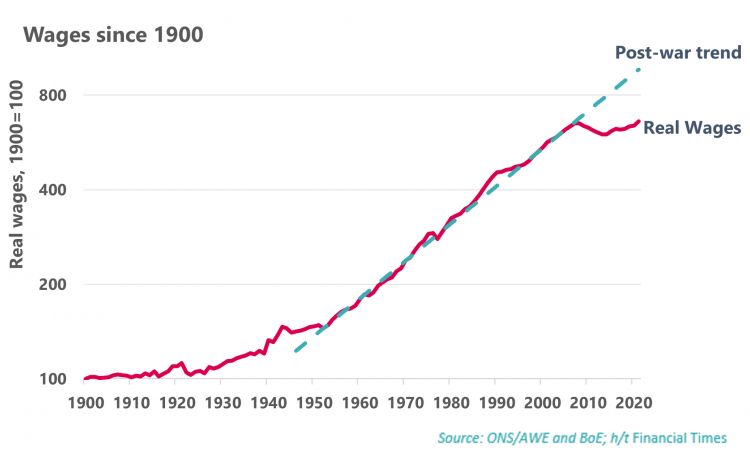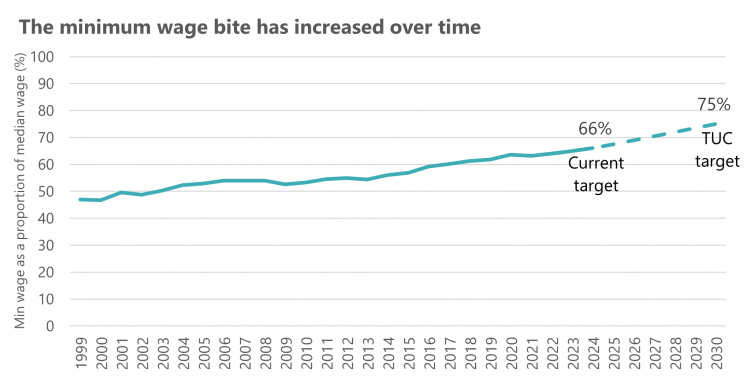We need a £15 minimum wage. This is how to get there
We need to transition the economy to high-wage, high-skilled and secure jobs. And shift our economic model away from a reliance on low-paid and insecure work.
As part of our package of measures to deal with the cost of living crisis, the TUC is also calling for the minimum wage to be uprated by at least inflation this October – as opposed to April next year when the uprating was due.
The minimum wage began life in 1999 against a backdrop of opposition from Tories, business groups, and even some economists. But since then, we have proven that the minimum wage is effective. It has delivered pay increases for the lowest paid workers, without causing job losses. There is now a widespread consensus in favour of the minimum wage. This reaches across academic experts and across political divides.
The TUC believes it is time for the minimum wage to take the next step. But if the minimum wage is just £9.50 an hour now, how do we get to £15? Here’s the plan:
1) Deliver a return to normal pre-crisis wage growth
Workers are living through the longest and harshest wage squeeze in 200 years, but it hasn’t always been like this. Up until the financial crash, wages saw sustained growth in every decade in modern
This wage stagnation has held the minimum wage back, because the wage floor is explicitly tied to median wages. The government must deliver a return to normal wage growth so workers get proper pay rises for the first time in over a decade.
We need to see sustained pay growth, year on year, so that median wages reach £20 an hour as soon as possible. This will underpin our £15 minimum wage. The government can make wage growth happen by delivering:
- A macroeconomic approach which boosts demand and creates growth
- A plan to strengthen and extend collective bargaining across the economy including introducing fair pay agreements to set minimum pay and conditions across whole sectors
- A life-long learning and skills strategy to fill labour shortages, boost productivity and so workers can update their skills throughout their working life
- Corporate governance reform to prioritise long-term sustainable growth, rather than short-term focus on shareholder returns
- Industrial and trade policies to promote good jobs and ensure that businesses compete on a level playing field
- Making decent jobs a requirement of all government spending and procurement.
2) Raise the minimum wage target to 75% of median wages
Secondly, the TUC believes government should raise its target for the minimum wage. The current target is 66 per cent of median wages by 2024. The obvious next step is 75 per cent.
Since it was introduced, the minimum wage has increased as a proportion of the median wage. The wage floor was introduced at 47 per cent and is now on its way to 66 per cent by 2024. As unions predicted, the evidence continues to show a positive effect on wages and no job losses.
The government should set its next target at 75 per cent of median wages and make progress towards this. The Low Pay Commission should be responsible for the path based on consultation and negotiation through its social partnership model which brings together unions, and independent experts. This model provides an effective way to make sure we can keep the minimum wage rising over time.
Conclusions
If our plans are implemented, we will get:
- A return to normal wage growth getting average wages up to £20 an hour
- A 75% minimum wage target establishing a £15 an hour minimum wage
This must be delivered as soon as possible. A government that is serious about wage growth will be able to get us there. And trade unions will also play a key role in getting wages to these levels more quickly. Workers in unions will see bigger pay rises. And in sectors with good collective bargaining coverage, a £15 floor will be implemented earlier. Fair Pay Agreements should be rolled out, and anti-trade union legislation should be repealed, so workers can win higher pay ahead of the minimum wage. Unions are already fighting for £15 in workplaces up and down the country and its time employers paid up.
Stay Updated
Want to hear about our latest news and blogs?
Sign up now to get it straight to your inbox



